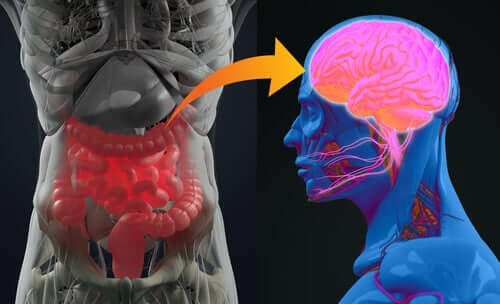It has long been known that the gut and brain are intimately linked, however, until now it was thought that this relationship was going in one direction: brain-intestinal, what many doctors and researchers are proving now is that this relationship can be established in both directions.
The gut microbiota can cause disorders such as anxiety or Alzheimer’s disease. The gastroenterologist and co-director of the Los Angeles Center for Digestive Research, Dr. Emeran Mayer, argues that the connection between the gut and brain is much greater than previously thought.
Thus, he concluded that physical and emotional discomfort can occur in the intestine.
The vagus nerve is the channel that connects the intestine and brain, is one of twelve cranial pairs and is responsible for the junction of the pharynx, esophagus, larynx, traffic, bronchi, heart, stomach, pancreas, etc. other elements of the digestive system that possess a large number of neurons.
In addition, digestive bacteria send signals to the brain through the vagus nerve to generate responses that promote specific dietary behaviors.
This helps in the release of neurotransmitters like dopamine and serotonin. Currently, there are several studies linking the gut microbiota to nutritional behavior.
This research shows that the gut microbiota plays a key role, among other things, influences weight and, more specifically, the reasons for gaining or losing weight.
Experiments with mice yielded surprising conclusions: it has been shown that by introducing bacteria that are usually found in the guts of obese people into the diet, the mice gain weight; if, on the other hand, the same diet contains bacteria from thin people, mice lose weight.
In another experiment, mice bred in a sterile environment were used. In these environments, there is no possibility that certain bacteria can colonize your digestive system.
These mice were later shown to have symptoms similar to those of autism in humans.
When stressful situations are maintained for a long time, the gut reduces its function so that the brain has some extra energy, leading to a situation where blood flow in the intestine is reduced, there is also a reduction in the protective lining that coats your body. walls, making them thinner.
Bacteria are very close to the intestinal walls and produce chemicals that cause inflammation, causing a modification of the gut microbiota that produces different metabolites that are sent to the brain.
Harvard University has published another of the most recent findings on this relationship between the gut and brain and demonstrated how, under certain eating habits, gut bacteria generate molecules that move into the brain.
These molecules act on astrocytes. This action appears to block inflammatory processes that cause neurodegeneration and cause diseases such as Alzheimer’s or Parkinson’s.
Given the close relationship that science shows us between the gut and the brain, we can act and work better from two different points in the treatment and prevention of anxiety and stress states.
We could even pursue this line of research to obtain better results in the prevention of serious neurodegenerative diseases, since the changes in the microbiota begin before the neurological symptoms begin.
New studies also confirm that mindfulness or stress reduction techniques have a powerful influence on the gut and its microbiota, thus facilitating physical well-being.
In addition, correct eating habits help keep the gut microbiota capable of maintaining, among other things, the correct psychological well-being of the human being.
Discoveries about the link between the gut and the brain already give us many clues about how a holistic approach to health will shape the future of the treatments and prevention programs that will develop.
The connection between body and mind now seems more likely than ever, it’s time to reconnect with our bodies.
It becomes necessary to take care of our minds and our eating habits, are we going to start listening to everything the body has to say to the brain?

